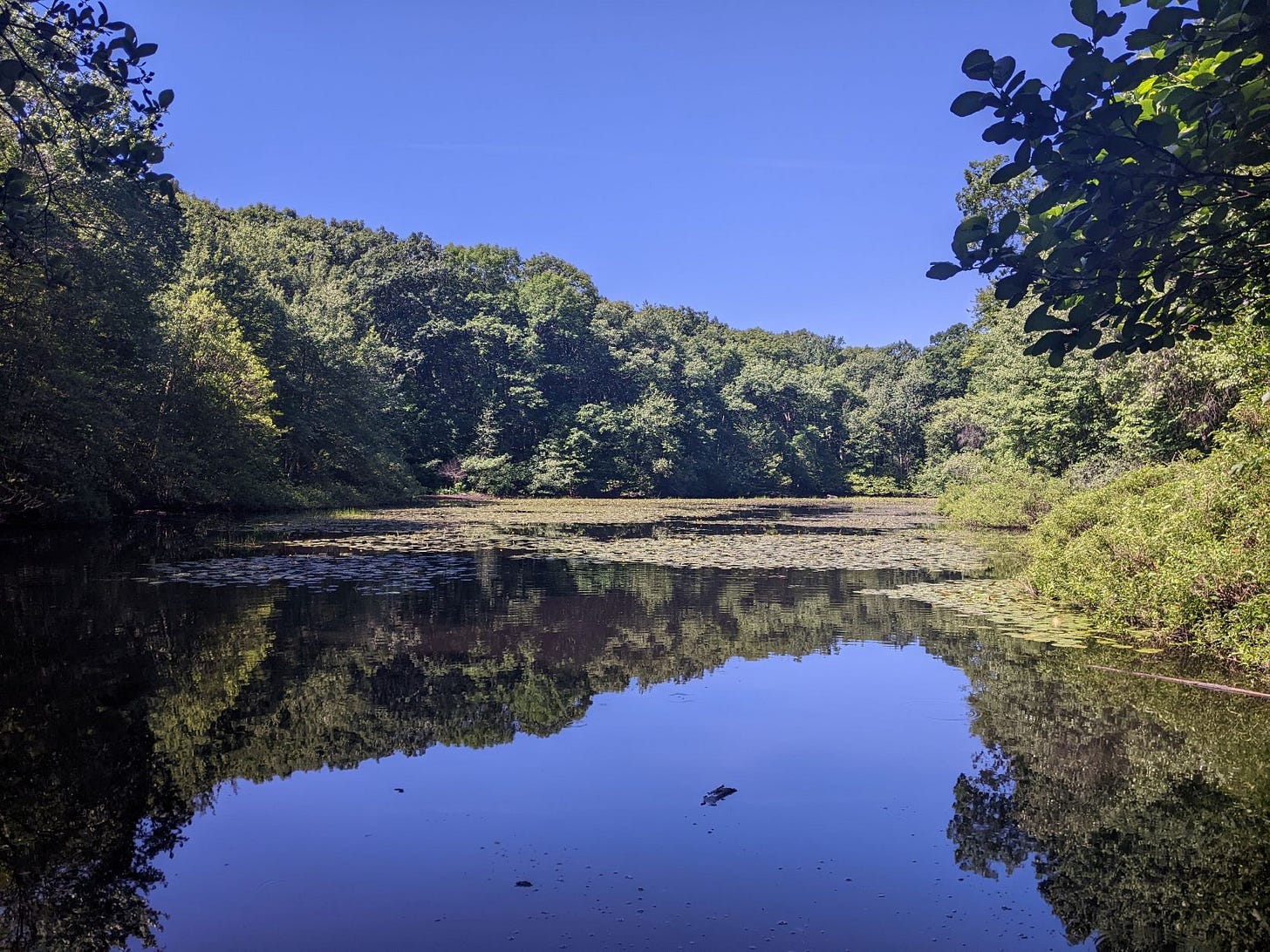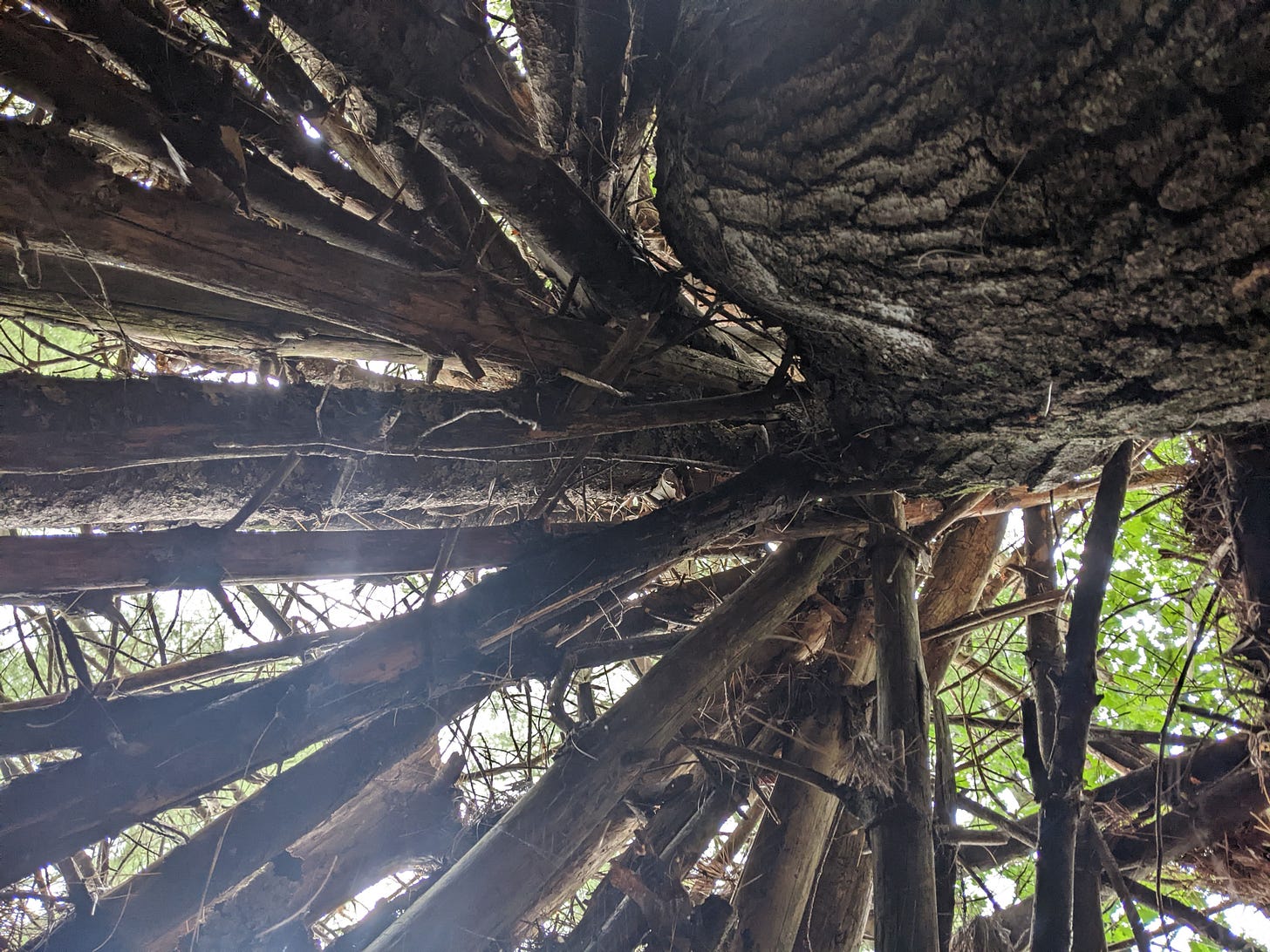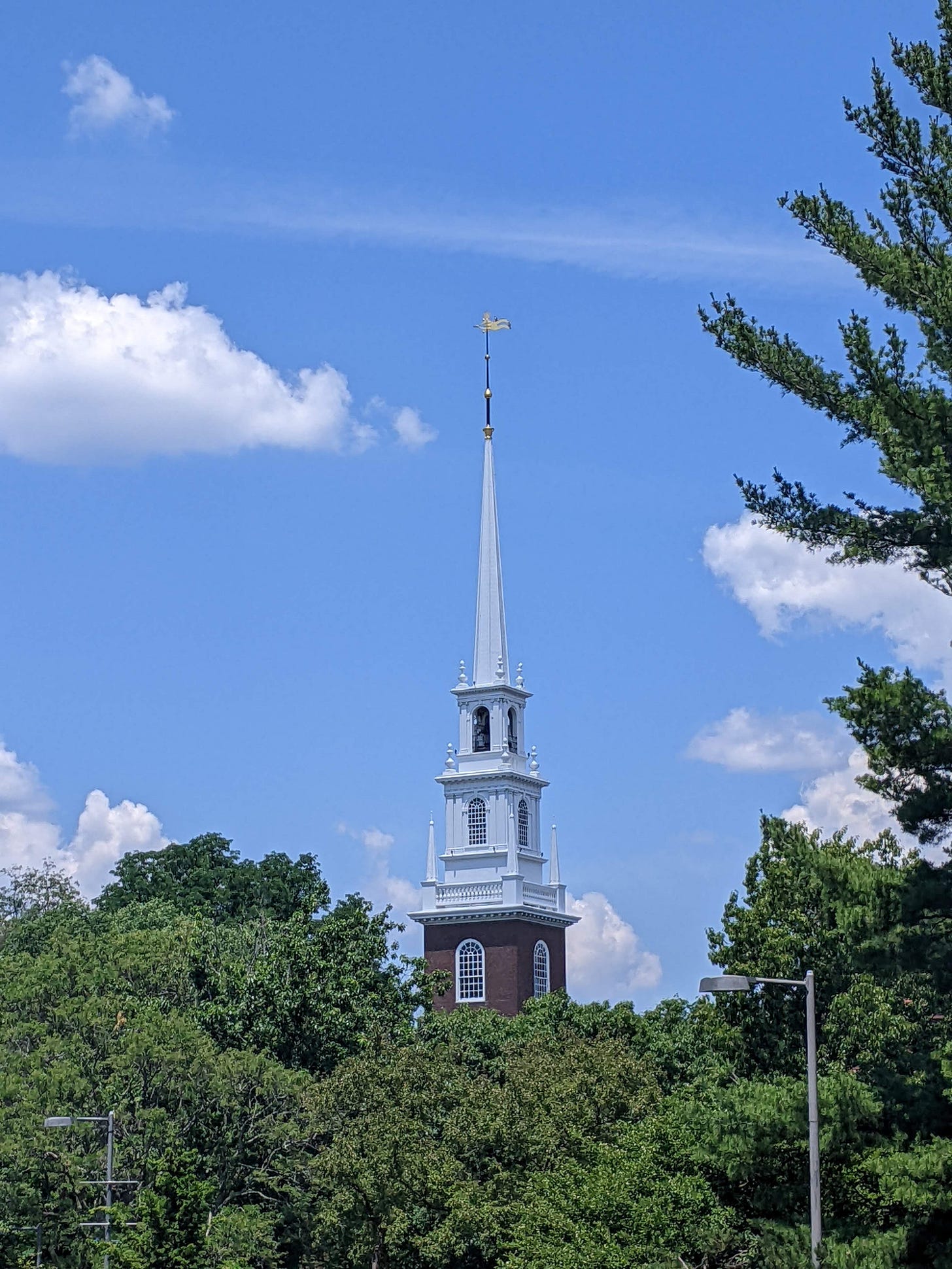Cognitive Liberty
Spiritual "freedom of" does not always lead to spiritual "freedom from"
If you find yourself in the right algorithms, you will sometimes hear psychedelic legalization discussed as a matter of “cognitive liberty.” Psychedelic advocates will argue this is a First Amendment matter, a freedom of consciousness which should be protected as part of the religious freedoms afforded by the Constitution. The argument goes something like this: it is a product of history that the Founders protected “religion” instead of “spirituality,” and that freedom of spiritual exploration is in line with the true intention and the spirit of the amendment.
As far as I believe religious freedom represents ontological freedom in America, I remain sympathetic to the spirit of this argument. But I also recognize there would be serious dilemmas created by redefining the First Amendment as simply “spiritual freedom,” given how this would be easily abused to subvert pro-social laws. As has been hotly and bitterly debated in the past several weeks of Supreme Court decisions, religious freedom is often a tension between “freedom of” and “freedom from” religion. An overly libertine codification of “spiritual freedom” might make protecting your freedom from another’s self-defined spiritual freedom difficult.
I am not getting into those legal weeds today, but the thicket raises for me an interesting question about cognitive liberty and psychedelics, and about spiritual freedom in general. As Paul famously said in 1 Corinthians 6:12, “All things are lawful unto me, but all things are not expedient: all things are lawful for me, but I will not be brought under the power of any.” In other words, when we are unwise in how we use our spiritual freedom of, we make ourselves have less freedom from our human situation, and might be subjecting ourselves to a different oppressor.
Setting aside the issue of legality, I have found it worth asking myself this: when I exercised my self-given “cognitive liberty” to take psychedelics, did it actually afford me, personally, more true cognitive liberty?
The Trap
Let me offer a little more about how I see The Trap of our incarnation on this beautiful rock.
If we’re human, we’re trapped. We’re trapped in our minds and trapped with each other as cosmic roommates. No matter who we are, we can share some solidarity in the fact that none of us asked to be here. When we practice gratitude, of course, we can discover every day in this predicament can be received as a blessing. But gratitude is something most of us have to practice, while suffering comes far more naturally (let’s not dwell too long on those who are naturally grateful, lest we resent them). Sparing the religious discussion of whether we call this trap dhukka, sin-consciousness, or whatever, we’re all born trapped into our consciousness.
Cognitive liberty is such a compelling idea, I think, because apart from the natural gurus in our midst, there is no self-evidently easy way out from this larger unitive trap. Beyond this simple unified solidarity, however, we recognize that we each have particular traps. We may have a shared solidarity in universal suffering, but our traps are all slightly different and uniquely challenging. Being privileged is, in one sense, to have materially more manageable traps.
For some of us, the daily life of being a human is such a routinely dark place that we can hardly judge another for how each chooses to escape it, even if such escapes are only temporary. While some means are more skillful than others, and some means create new traps, people who use drugs to escape their traps should not be condemned as having any kind of moral defect by virtue of their choice of cognitive escape clause.
In fact, I find many religions teach that we must always have humility because most means of escaping our human trap turn out to be another trap—including religion. In my experience, the dance of religion is trying to get free from one trap without getting caught in the trappings of religiosity itself, seeking wisdom without pride, discernment without condemning judgment, building community without building a cult.
The situation of our suffering is so dire that one coping mechanism is to be genuinely deluded that the confines of humanity do not apply to us. As told in the Tower of Babel, the human impulse for transhumanism is one of our most ancient. Few of us would openly admit to this transhumanist impulse, and most of them attend cryptocurrency conferences. Instead, this impulse usually shows up unconsciously and repeatedly throughout our lives. There is a corresponding virtue of finding, testing, and pushing ourselves past false limitations. But the original vice is in believing that the rules don’t apply to us and that we ourselves are gods. This is a trap that runs the risk not only of destroying ourselves. The transhumanist trap runs the risk of trapping, and straight up genociding, others in the name of a false transcendence towards a false perfection.
Judging Evil
While we should not be judgmental about how others seek liberation, we should also take care to remain discerning. Discernment still holds onto a belief that there is such a thing as right and wrong, balanced by humility but not drowned by the false humility of false enlightenment. Judgment imposes a rigid, faux clarity, but this does not mean discernment seeks cognitive vaguery and moral relativity; discernment seeks wisdom and a true, loving moral clarity. In our efforts to be less judgmental, we must not toss out our discernment. This discernment can lead us into wiser evaluations of what constitutes true liberation from the false liberation that is yet another prison. We can decry behavior, admonish actions, and resist the ways in which evil works through humans— “the flesh, the world, and the devil”—without condemnation of the ultimate personhood of those caught in it. I hope my words here do not land on the judgmental side of discernment!
Because I know evil still works through me. The way I see it, evil works overtime in all of us. Evil works best through our unconsciousness, especially active when we deny that it is working through us. As post-Jungian Robert Moore said, every day is a battle to find not if it works, but where it works within us, and where we continue to profit from it. The battle within the battle is not to fight evil with more evil, including within ourselves: the “inner jihad.” And every day is a battle to have compassion for those who we most clearly see evil working through, especially if we most clearly see it in ourselves.
In my view, evil works most often through our faulty escape attempts from our human trappings. Sometimes these escapes are so temporarily ecstatic that we think we are sharing heaven, when in the long run we might be recruiting others into our hell.
Psychedelic Liberation?
For those who have used psychedelics as a method to escape the trappings of our humanity, it begs discernment on whether our use is a reliable, skillful method of escaping the trap of humanity, or whether we are caught in new traps, bringing others into a different hell we can’t even see.
We can get more granular in this trap business. When we talk about any kind of medicine, we are seeking changes to our conscious experience of traps-within-the-trap. Beyond other physical and psychological ailments, a spiritually-dead consciousness is another horrible way to spend humanity. There are some means for liberation from these lesser traps that are temporary enough that they do not ensnare us.
For those who have been released from the grips of addiction, healed from PTSD and other traumatic disorders, or have found their relationship with spirituality reignited by psychedelics, I am in solidarity with your healing. Your stories matter, and you know better than I do that they are no small matter. To have found an experience of freedom from cruel cognitive hells of addiction, trauma, and a cold, uninspired materialism is profound.
I would caution, however, that the hardest traps to see are the ones that just liberated you from another trap. Financial freedom out of poverty turns into greed, sexual liberation turns into the hedonic treadmill, becoming religious in the wake of curing your alcoholism sometimes just makes you an asshole. And for some, psychedelics become such an idol of liberation that they become “psychevangelists.”
To many, psychedelics are an urgent hope to free people from the trap of our opioid addiction crisis which was, itself, an attempt at liberation from a prior trap of pains. Big Pharma saw they had a new profitable tool that needed nails, so they overprescribed their hammer. While I personally know several people who have escaped opioids because of psychedelics—and thank God they did!—we must recognize that Big Psychedelia now likewise has an uncomfortable flirtation with its favorite panacea. They are powers and principalities with no such qualms about setting traps, because traps are profitable.
I am writing all this because I am filled with despair about seeing new faces falling into the subtle traps I fell into, traps I thought were liberation, traps perpetuated by psychedelic veterans who know better than to offer what they promise. And I am no prophet, but in the near future, I believe there will be many more people left footing the psychological bill as a result of psychedelic misuse caused by continued uncritical hype. In fact, unlike a psychedelic utopia, this future may be already here—if you go to any psychedelic conference, you will likely observe there are demonstrable psychological side effects to psychedelics use, coupled with a discourse that is still largely (though not completely) in denial about them. I should know, because I was one of these people who was in denial about my own issues and not being candid about them.
More Beautiful Chains
During my brief time working in IT, I remember setting up WiFi for a billionaire on his fifth vacation house. What struck me as silly was knowing how much he and his kids were constantly on the internet, making his mansion little more than an expensive wall charger. And while exorbitant wealth certainly offers more material freedom in one sense, in another sense, his wealth is a measure of how enslaved he was by it and to it. Its very existence demonstrates it is inconceivable that he could walk away from his greed absent some true spiritual awakening. For what its worth, I do not see many tripping billionaires talking about this possibility at Davos; it seems a psychedelic prosperity gospel is more en vogue.
Just as with a billionaire’s wealth, whatever we’re unwilling to walk away from has trapped us. In my analysis, if we're not able or willing to walk away from them, psychedelics have trapped us. One may bargain that this trap has acceptable terms given the dire nature of The Trap. But if one cannot entertain the notion of sacrificing psychedelic experiences, it may raise the question as to whether a form of addiction is in play.
For myself, I now question whether the wild paths psychedelics took me through actually resulted in a life that is happier and more thriving for myself or offering the greatest contribution to my loved ones and my community. I wonder about how many psychedelically-induced spiritual diseases infected me, and I have questions about how many others who dealt with my selfishness would agree.
However, I am starting to get some clarity, because the farther I walk away from psychedelics and the associated “set and setting” of a mutually harmful subculture, walking deeper into my spiritual practice, deeper into my religious community, deeper into candor, I feel myself slowly growing in my peace, my joy, my love as expressions of a growing cognitive liberty from. If psychedelics have done nothing else for me, their portals to grandiosity have at least made my prayer life more sincere to escape my self-inflation, which I still suffer from each day. It's taken new practices, new prayer, a renewal to reading sacred texts that seem more relevant than ever, but I believe this growth in freedom is real.
Psychedelics can liberate from some addictions, giving the window to address these traps. And as has been routinely noted, some indigenous cultures use psychedelics ritualistically within their spiritual context, embedded in a community that offers mutual liberation through their traditional practices, interlocking kinship relations, and mutual accountability. My words here are not a comment on how they understand spiritual liberation, and it is beyond my scope to comment at all except to say that that Westerners cannot easily enter into this context, though we love to try.
Ultimately, I agree with the thrust of Ram Dass in Be Here Now, a man on the Mount Rushmore of trippers: if our spiritual practice revolves around chasing personal ecstatic experiences and our personal notions of transcendence, we actually haven’t transcended anything. We’re just in more beautiful chains.
Freer Freedom
I am so grateful to say that I am finding there is something more liberating than an ecstatic experience, found in its sacrifice. I realize I may have run through multiple red lights of boasting by now. If I am failing to be humble, I apologize, but I am just being an honest journalist that I am finding an even more direct experience than my former “direct experiences.”
Many of you are not Christian, nor will you ever be, and I honor that. I believe God speaks and has spoken to people in the cultural languages they could understand for their time and place. The teachings of Christ echo throughout so many of the other great traditions, indeed, through all creation. And this Christ yearns to heal people to liberate them from their ailments, including when the cure becomes a poison.
I have been calling myself a Christian again for a few years now. But perhaps I did not really become a Christian until I learned how a life in Christ really can set us free. To be clear, many of us rely on substances to manage pain both quotidian and existential, and this has no bearing either direction on this freedom. I am not disavowing our participation in modern medicine. Nor am I casting aspersions on indigenous relationships to psychedelic plants.
Perhaps your spiritual freedom and cognitive liberty will lead you to continue using psychedelics. If so, I am not here to judge you, but discern with you—and perhaps ask you to exercise discretion, like some folks I know who run underground churches, over psychevangelism. And if you have a perspective that is different from mine, I would love to hear it.
I hope that, wherever Christ lives and however he presents himself and whether he calls himself Christ to you or not, that you may find his freedom that lives beyond all form. It is a freedom of the Spirit that is not dependent on any religion nor any phenomena whatsoever.
For whatever freedom psychedelics once gave me, I report with gratitude and candor that I am finding an even freer freedom. And I am finding joy again.
July 4th, 2022
Indwelling Update
Later this week, I will be splitting my newsletter into two parts. This main Indwelling feed will continue to be the place for my longer-form, theologically-driven essays, sermons, and syntheses. It might occasionally touch on psychedelic themes, but less often, and less directly, than in the past.
I will be creating another newsletter called Psychedelic Candor which will be for (usually) shorter pieces, attempting to share snippets of open, sincere, and occasionally frank perspectives on psychedelics. I don’t know how long I will do that newsletter, or exactly how often; I am entering my last year of grad school, and I rather like envisioning a future where I do not have to write about psychedelics. For now, I have a lot of thoughts I feel a need to share, and I would like to create a feed just for those thoughts.
If you like the idea of reading both of these newsletters, current Indwelling subscribers will automatically be subscribed to both. If you would like to unsubscribe from one or the other, that option should be easy, too.






"In my experience, the dance of religion is trying to get free from one trap without getting caught in the trappings of religiosity itself, seeking wisdom without pride, discernment without condemning judgment, building community without building a cult."
Love it. I'm right there.
I arrived at sort of my way of saying this: All religion is blasphemy.
Love the depth of thought on various dimensions of freedom. It gives me a lot to think about with my own circumstances and the things I hope are freeing me that may in fact just be my preferred shackles. Thank you.